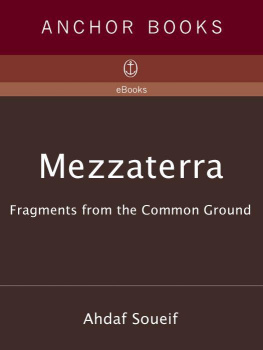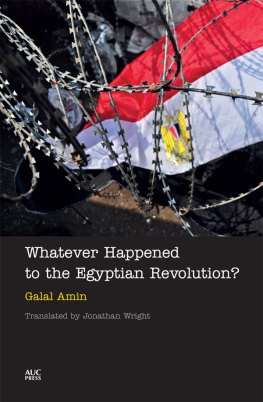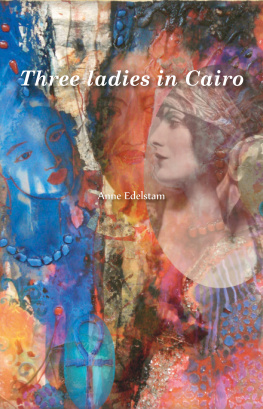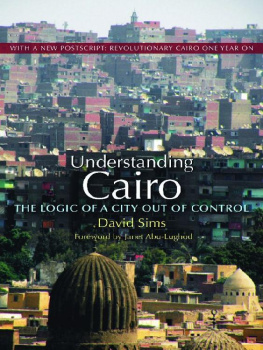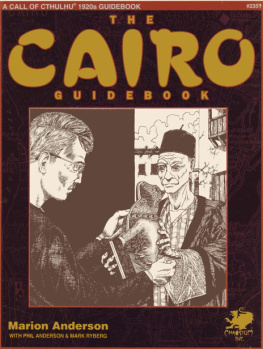Ahdaf Soueif - Cairo: My City, Our Revolution
Here you can read online Ahdaf Soueif - Cairo: My City, Our Revolution full text of the book (entire story) in english for free. Download pdf and epub, get meaning, cover and reviews about this ebook. year: 2013, publisher: A&C Black, genre: Detective and thriller. Description of the work, (preface) as well as reviews are available. Best literature library LitArk.com created for fans of good reading and offers a wide selection of genres:
Romance novel
Science fiction
Adventure
Detective
Science
History
Home and family
Prose
Art
Politics
Computer
Non-fiction
Religion
Business
Children
Humor
Choose a favorite category and find really read worthwhile books. Enjoy immersion in the world of imagination, feel the emotions of the characters or learn something new for yourself, make an fascinating discovery.

- Book:Cairo: My City, Our Revolution
- Author:
- Publisher:A&C Black
- Genre:
- Year:2013
- Rating:3 / 5
- Favourites:Add to favourites
- Your mark:
- 60
- 1
- 2
- 3
- 4
- 5
Cairo: My City, Our Revolution: summary, description and annotation
We offer to read an annotation, description, summary or preface (depends on what the author of the book "Cairo: My City, Our Revolution" wrote himself). If you haven't found the necessary information about the book — write in the comments, we will try to find it.
Cairo: My City, Our Revolution — read online for free the complete book (whole text) full work
Below is the text of the book, divided by pages. System saving the place of the last page read, allows you to conveniently read the book "Cairo: My City, Our Revolution" online for free, without having to search again every time where you left off. Put a bookmark, and you can go to the page where you finished reading at any time.
Font size:
Interval:
Bookmark:
AHDAF SOUEIF

For Laila, Ahmad Seif, Mona, Sanaa,
Manal, Alaa and Khaled
Many years ago I signed a contract to write a book about Cairo; my Cairo. But the years passed, and I could not write it. When I tried it read like an elegy; and I would not write an elegy for my city.
Then, in February 2011, I was in Tahrir, taking part in the revolution, and reporting on it. Alexandra Pringle, my friend and publisher, called me; this, she said, must be the moment for your Cairo book. I fought it. But I feared she was right.
I say feared because I wanted more to act the revolution than to write it. And because I was afraid of the responsibility. Jean Genet, in his book that I most admire, Un captif amoureux, writes: I am not an archivist or a historian or anything like it This is my Palestinian revolution told in my own chosen order. I cannot say the same. This story is told in my own chosen order, but it is very much the story of our revolution.
It proved impossible to sit in a corner and write about the revolution. What was happening, what is happening, needed and needs every one of us to be available at all times to do whatever the lets call it the revolutionary effort might need; whether its marching or standing or talking or mediating or writing or comforting or articulating or So I tried to revolute and write at the same time and I soon realised two things: one, that I could not write what was fast becoming the past without writing the present. Two, that for this book to be as I wanted it to be and believed it should be, an intervention, rather than just a record, it needed to take in and on as much of this present as possible.
A revolution is a process, not an event. And, as you know, our Egyptian revolution is ongoing. And its path has not been smooth. How could it have been when the interests we are seeking to break free of are so powerful and so pervasive?
But we were given, we were vouchsafed, eighteen golden days; eighteen days when we all pulled together to get rid of the head of the regime that was destroying us and our country and everything we held dear; eighteen days that brought out the best in us and showed us not just what we could do but how we could be. And it was this way of being, as well as what it achieved, that captured the imagination of the world; that made the Egyptian revolution an inspiration for the peoples movements that are crystallising across the planet. Every Egyptian I know is both proud of this and humbled by it. I know I am.
So its with pride and humility and confidence and fear, but above all with solidarity and hope, that I put this book before you.
Ahdaf Soueif
Cairo, October 2011
The river is a still, steely grey, a dull pewter. Small scattered fires burn and fizz in the water. Weve pushed out from the shore below the Ramses Hilton and are heading into mid-stream. My two nieces, Salma and Mariam, are on either side of me in the small motor boat. As we get further from the shore our coughing and choking subsides. We can draw breath, even though the breath burns. And we can open our eyes
To see an opaque dusk, heavy with tear gas. Up ahead, Qasr el-Nil Bridge is a mass of people, all in motion, but all in place. We look back at where we were just minutes ago, on 6 October Bridge, and see a Central Security Forces personnel carrier on fire, backing off, four young men chasing it, leaping at it, beating at its windscreen. The vehicle is reversing wildly, careering backwards east towards Downtown. Behind us, a ball of fire lands in the river; a bright new pool of flame in the water. The sky too is grey so different from the airy twilight you normally get on the river at this time of day. The Opera House looms dark on our right and we can barely make out the slender height of the Cairo Tower. We dont know it yet, but the lights of Cairo will not come on tonight.
A great shout goes up from Qasr el-Nil. I look at Salma and Mariam. Yes, lets, they say. I tell the boatman weve changed our minds: we dont want to cross the river to Giza and go home, we want to be dropped off under Qasr el-Nil Bridge.
And that is why we myself and two beautiful young women appeared suddenly in the Qasr el-Nil underpass among the Central Security vehicles racing to get out of town and all the men leaning over the parapet above us with stones in their hands stopped in mid-throw and yelled Run! Run! and held off with the stones so they wouldnt hit us as we skittered through the screeching vehicles to a spot where we could scramble up the bank and join the people at the mouth of the bridge.
That day the government the regime that had ruled us for thirty years had cut off our communications. No mobile service, no Internet for all of Egypt. In a way, looking back, I think this concentrated our minds, our will, our energy: each person was in one place, totally and fully committed to that place, unable to be aware of any other, knowing they had to do everything they could for it and trusting that other people in other places were doing the same.
So we ran through the underpass, scrambled up the bank and found ourselves within, inside, and part of the masses. When wed seen the crowd from a distance it had seemed like one bulk, solid. Close up like this it was people, individual persons with spaces between them spaces into which you could fit. We stood on the traffic island in the middle of the road. Behind us was Qasr el-Nil Bridge, in front of us was Tahrir, and we were doing what we Egyptians do best, and what the regime ruling us had tried so hard to destroy: we had come together, as individuals, millions of us, in a great cooperative effort. And this time our project was to save and to reclaim our country. We stood on the island in the middle of the road and that was the moment I became part of the revolution.
A month before, a week before, three days before, we could not have told you it was going to happen. Yes, there had been calls to use National Police Day on 25 January as an occasion for protests, but there had been so many protests and calls for protests over the years that it hadnt seemed special. Those of us who were in Egypt intended to join, for forms sake and to keep up the spirit of opposition. Those of us who werent well, werent.
Me, I was in India, at the Jaipur Literary Festival. Late on the 24th I did an interview with Tehelka TV:
for a very long time now, our perception is that [Egypt] is not being run in the interests of the Egyptian people. And the primary motivation of the people who are governing us is that they should remain in power in order to continue ransacking and looting the country. Now, the main support that they have to remain in power is of course the Western powers particularly the United States. And the price that they pay in order to be supported is to run policies that favour Israel.
Weve been watching whats been happening in Tunisia and weve been very excited by it. You hear: now, will Egypt move? And you hear: Egypt is too big too heavy.
It really does not look as if the government is going to allow a peaceful and democratic change. So whats going to happen? Will we get a situation where people sort of, erupt? And you get blood on the streets? And will the army come down? Nobody knows. It feels very unstable. And it feels dangerous. And all the activism that happens is in specific areas. And its all young people and its all really without a leadership but its there. Its keeping the streets alive. Weve never had as much civil unrest in Egypt as weve had in the last five years. And that is good. That is good but, how will it coalesce? And what shape will that take?
Font size:
Interval:
Bookmark:
Similar books «Cairo: My City, Our Revolution»
Look at similar books to Cairo: My City, Our Revolution. We have selected literature similar in name and meaning in the hope of providing readers with more options to find new, interesting, not yet read works.
Discussion, reviews of the book Cairo: My City, Our Revolution and just readers' own opinions. Leave your comments, write what you think about the work, its meaning or the main characters. Specify what exactly you liked and what you didn't like, and why you think so.

